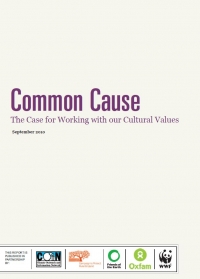Common Cause. The case for working with our cultural values
"There is an irony at the heart of much campaigning on global challenges - including campaigning on humanitarian and environmental crises: as our awareness of the profound scale of these challenges and the difficulty of addressing them grows, we tend to rely ever more heavily upon a set of issue-specific tactics which may actually militate against the emergence of the systemic and durable solutions that are needed.
Whatever the recent successes of civil society organisations in helping to address such challenges, it seems that current responses are incommensurate with the scale of the problems we confront. It is increasingly evident that resistance to action on these challenges will only be overcome through engagement with the cultural values that underpin this resistance. It also seems clear that, in trying to meet these challenges, civil society organisations must champion some long-held (but insufficiently esteemed) values, while seeking to diminish the primacy of many values which are now prominent - at least in Western industrialised society.
The values that must be strengthened - values that are commonly held and which can be brought to the fore - include: empathy towards those who are facing the effects of humanitarian and environmental crises, concern for future generations, and recognition that human prosperity resides in relationships - both with one another and with the natural world. Undoubtedly these are values that have been weakened - and often even derided - in modern culture. They are not, for example, values that are fostered by treating people as if they are, above all else, consumers. But they are values that have an ancient and noble history within Western thinking, and they still fundamentally inform much public debate. They are there to be activated and strengthened. We believe that everyone - individual citizens, civil society organisations, government and business - can play an active role in strengthening them. Indeed, they are values that must be championed if we are to uncover the collective will to deal with today's profound global challenges.
Civil society organisations must not shrink from making the case for strengthening these values, or beginning to work to ensure that their communications and campaigns contribute to this effort. But this process must be transparent, inclusive, and reflexive. Many vested interest groups have long understood the mechanisms by which values are promoted culturally, and many have worked - consciously or unconsciously - to help embed those cultural values that serve their purposes, often without public scrutiny or debate. The approach that we outline here is very different. Rather, in working to strengthen helpful values, civil society organizations can seize the opportunity to openly describe their strategies and why they take these to be important. They can work to include the widest possible range of perspectives in building on the evidence base that science provides. And they can embody the values that they espouse in the design of their communications and campaigns in inspiring ways.
Debates on the consequences of cultural values and the mechanisms by which they evolve must become as vigorous as public debate about the evidence base for government policy, business practice or civil society campaigns. There is a crucial and exciting role for civil society organisations in ensuring that this becomes the case."
Quelle: Crompton, Tom (2010), Common Cause. The case for working with our cultural values, 100 S.




